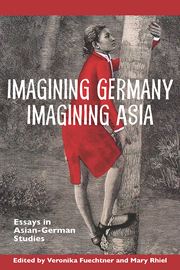Book contents
- Frontmatter
- Contents
- Acknowledgments
- Introduction
- Part I Contemporary Challenges to German Borders and Identities
- 1 East-West Globality and the European Mode of Film Production
- 2 Citizenship-Shifting: Race and Xing-Hu Kuo's Claim on East German Memory
- 3 Narratives of Transnational Divide: The Vietnamese in Contemporary German Literature and Film
- 4 Factories on the Magic Carpet: Heimat, Globalization, and the “Yellow Peril” in Die Chinesen kommen and Losers and Winners
- Part II Travel and Representation
- Part III Asia Inhabits Germany's Cultural and Intellectual History
- Bibliography
- Notes on the Contributors
- Index
2 - Citizenship-Shifting: Race and Xing-Hu Kuo's Claim on East German Memory
from Part I - Contemporary Challenges to German Borders and Identities
- Frontmatter
- Contents
- Acknowledgments
- Introduction
- Part I Contemporary Challenges to German Borders and Identities
- 1 East-West Globality and the European Mode of Film Production
- 2 Citizenship-Shifting: Race and Xing-Hu Kuo's Claim on East German Memory
- 3 Narratives of Transnational Divide: The Vietnamese in Contemporary German Literature and Film
- 4 Factories on the Magic Carpet: Heimat, Globalization, and the “Yellow Peril” in Die Chinesen kommen and Losers and Winners
- Part II Travel and Representation
- Part III Asia Inhabits Germany's Cultural and Intellectual History
- Bibliography
- Notes on the Contributors
- Index
Summary
After German reunification, print capitalism played a central role in what Uli Linke has called “the fabrication of a new national imaginary.” Memoirs flooded the book market in the 1990s as dissidents, informers, prisoners, and former agents of the Ministry for State Security (Ministerium für Staatssicherheit, MfS, or Stasi) recounted the East German experience in “memory texts” that frequently blurred the line between fact and fiction. A dilemma about the present underwrote these discussions about the past: what would national identity mean in a reunified Germany? From the outset, people of color expressed concern about the potentially exclusionary nature of memory as a basis for post-Wall citizenship. In 1995, Turkish-German author Zafer Şenocak drew attention to the fact that the category of memory implied a national framework and a “community of fate” defined by shared heredity “to which Others have no access.”
The scarcity of memoirs by people of color reinforced the impression that memory work was a racially exclusionary form of nation-building. Anke Pinkert has observed that although racial difference was a common metaphor in memory texts, the actual voices of minorities were vanishingly rare. To cite one example, the book Boat People aus Leipzig (Boat people from Leipzig) used Southeast Asian refugees as metaphors for East Germans rather than as actual subjects. Related tropes cast racial otherness as a category to be escaped, as in the hope that East Germans would “not be treated like the nigger anymore.”
- Type
- Chapter
- Information
- Imagining Germany Imagining AsiaEssays in Asian-German Studies, pp. 34 - 49Publisher: Boydell & BrewerPrint publication year: 2013



